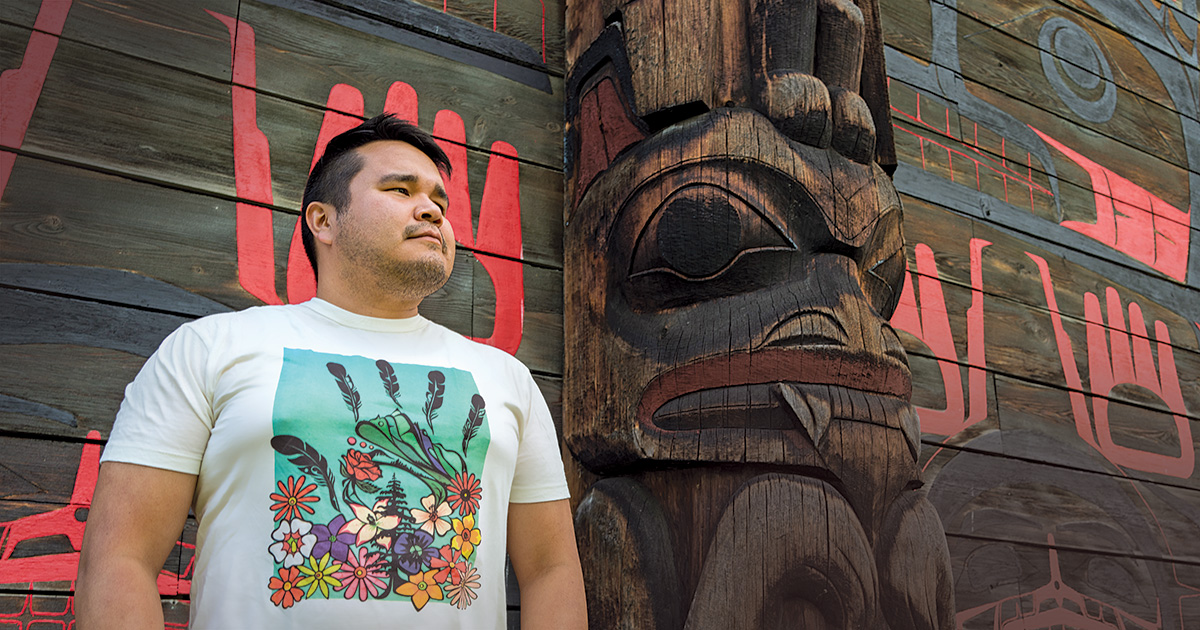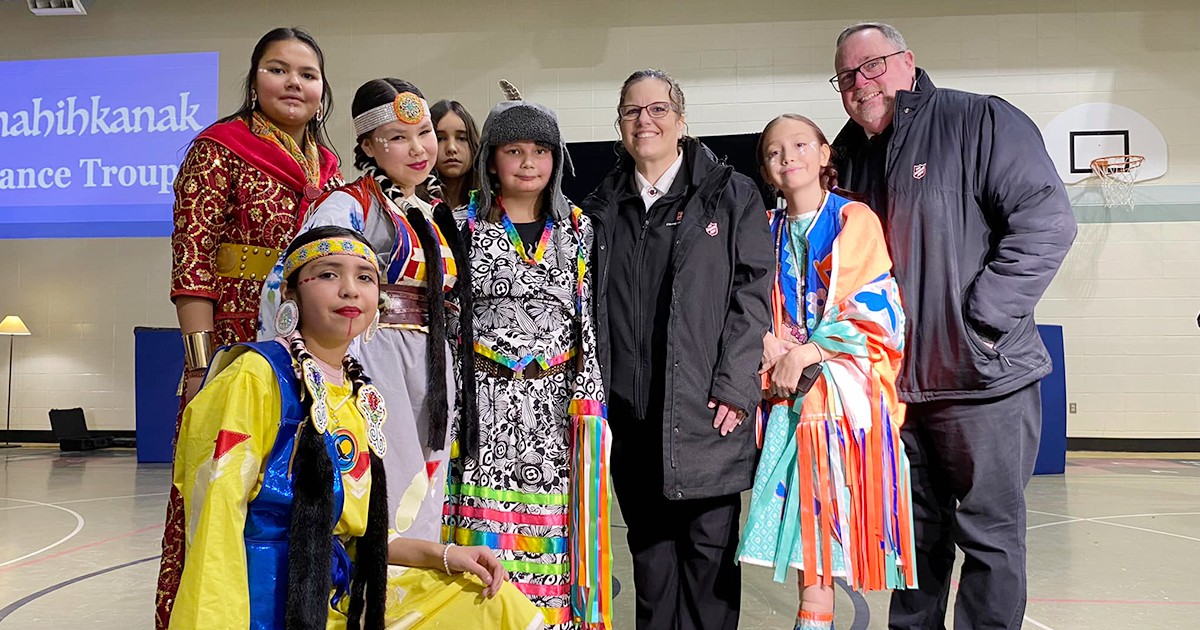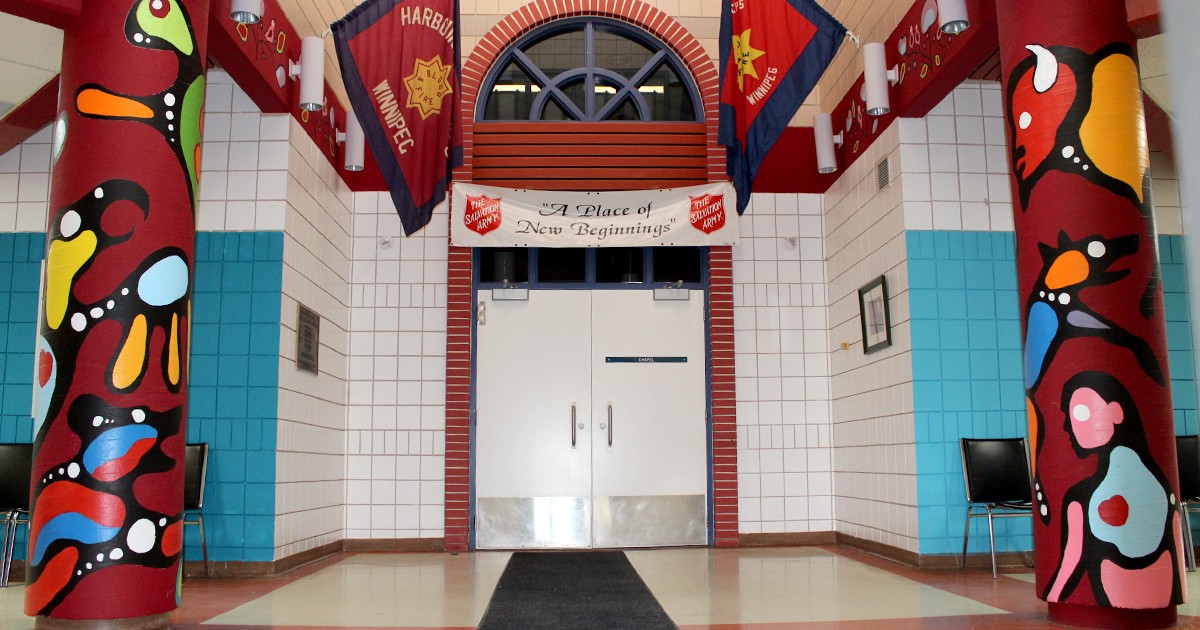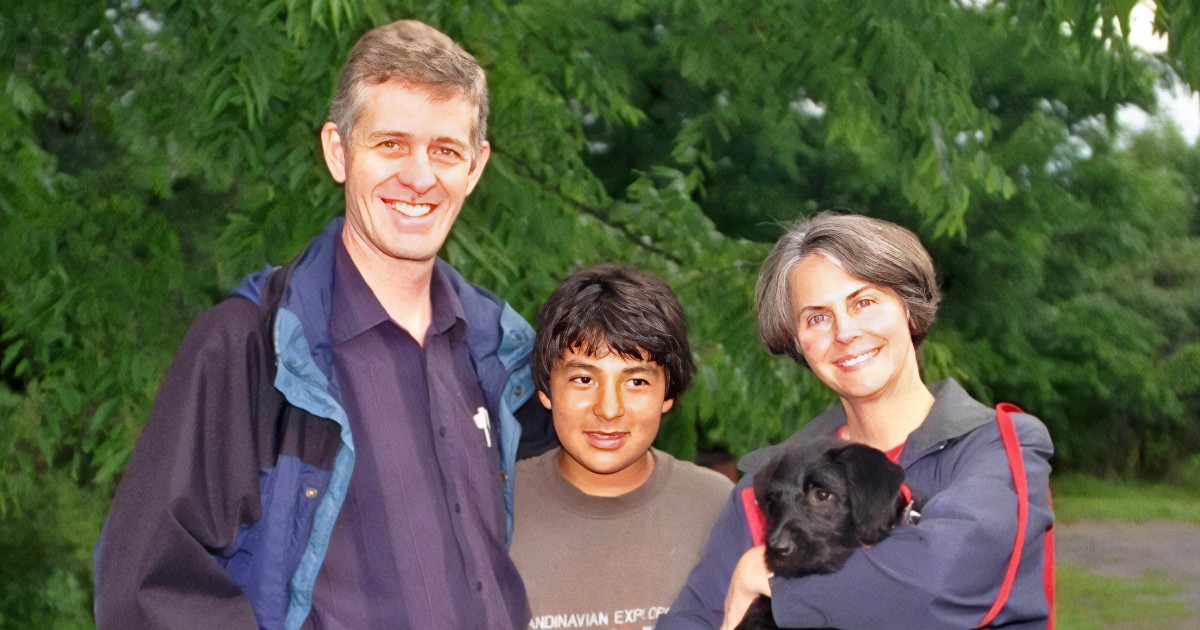(Above) Alex Stoney wears a T-shirt designed by his sister, Gitxsan artist Michelle Stoney, in honour of Indian residential school survivors. The artwork is entitled Majagalee, which is the word for children and flower in the Gitxsan language (Photo: Adrienne Stoney)
Words hold great meaning. A simple phrase can inspire and motivate communities to rally support. It can invoke political and systemic change. It can transform how we view creation. Words have the power to bring us together or tear us apart. This month, our contributors tackle common phrases heard in reconciliation conversations between Indigenous people and settlers. Adding their perspectives, they actively explore what it means to journey on the road to reconciliation. As you read, consider how these phrases encourage deeper learning and how they settle in your heart.
Every Child Matters
BY ALEX STONEY
Every child matters. You’ve probably heard that slogan before, perhaps many times, especially since May 27, 2021, when the unmarked graves of 215 children were recovered from a former Indian residential school in Kamloops, B.C. That number has been revised to 200, but that is still 200 too many. Not to mention the thousands of other unmarked graves found at former Indian residential schools across Canada and the United States. My heart is broken for these children and their families and friends.
Both of my grandparents are survivors of Indian residential schools, and the abuses they endured affected their lives in many ways, although my grandmother hasn’t spoken about it much. My grandfather suffered from substance abuse for many years. They were both punished for speaking their language and only allowed to speak English. This was especially challenging for those who only knew how to speak their native tongue.
My mother and her siblings dealt with the intergenerational trauma while growing up. Because my grandparents were forced not to speak our native tongue, Gitxsanimx, my mother was not immersed in it, and it was a challenge for her to learn. I have not been able to learn how to speak Gitxsanimx fluently. This is just one small example of how cultural ways of being were taken from Indigenous nations all across Turtle Island.
My Ye’e (grandfather) and Granny had a large family, and we continue to live our culture on our unceded territories. It is unfathomable to comprehend how many families have been affected by the cultural genocide of Indian residential schools. So many stories, cultures and lives were cut short by these violent acts of colonization financed by the government and operated by many church denominations.
What is “Every Child Matters”? It is a reminder that atrocities have happened to our most vulnerable. It is a reminder that Indigenous children are still being mistreated by our government. For example, in 2019, Cindy Blackstock, a member of the Gitxsan First Nation, fought for and won a human rights case against the federal government for spending significantly less per child in Indigenous communities than in provincial child welfare systems. The federal government has since filed an appeal to try to overturn this decision.
There is much more to be done to ensure that “Every Child Matters” becomes a reality. I invite you to learn more.
Alex Stoney is a member of the Gitxsan Nation. He is the children and youth ministry co-ordinator, Upper Skeena Circuit with Gitsegukla, Hazelton and Sik-E-Dakh (Glen Vowell), B.C
All My Relations
BY LIEUTENANT NATHANAEL HOEFT
“W ho is my neighbour?” An expert in the law asked Jesus this question in Luke 10. To answer, Jesus told the parable of the Good Samaritan, one of the most beloved of Jesus’ teachings. It shows that no matter what our political or socio-economic differences are, you can still be a good neighbour to those you see by showing love in the face of hardship. In Mark 12:30- 32, Jesus said that the whole of the law can be summed up in two commands: love God and love your neighbour.
In our increasingly individualistic society, the question could be: “How can I aid reconciliation work with marginalized communities?” There is a phrase, often used by Indigenous people, that counters individualism: “All my relations.” While this phrase can appear to mean those to whom we are related, this is not nearly the intention. In One Native Life, Ojibway author Richard Wagamese explained: “When we say, ‘all my relations,’ it’s meant in a teaching way, to rekindle community. We are a part of the great, grand circle of humanity, and we need each other.”
I believe that Jesus’ teaching to love our neighbour and the Indigenous phrase “all my relations” show us God’s character. Love for our neighbour is boundless, just as the acknowledgment that we are connected to all of creation, not just humanity. The human species cannot survive without water, without trees and plants, without animals. Nor can the human species thrive without community. We honour God’s creation, acknowledging the interconnectedness of the world, when we say “all my relations.”
Unfortunately, in our predominantly settler society, aggressive consumption of our world’s resources has ravaged creation for personal gain and comfort, causing ripple effects. Loving my neighbour means I acknowledge how my actions affect those around me and their ability to thrive. The way of loving my neighbour and seeing the world as “all my relations” helps me lose the sin of pride and selfishness. It also gives me a new perspective on how to walk more gently with creation and subsequently with my neighbours, both close to home and around the globe. In doing so, God’s loving character can be shown to the world through me.
Lieutenant Nathanael Hoeft is the corps officer in Williams Lake, B.C
What is Decolonization?
BY REBEKAH McNEILLY
We frequently hear the word “decolonization” today, but what does it mean? It’s typically used in two ways: to refer to resistance to a legacy of colonialism by Indigenous people around the world, and to describe changes in policy, best practices and in the structure of an organization.
To understand decolonization, we must first understand colonialism, defined as “control by one power over a dependent area or people.” Historically, this was violent and involved the forceful “claim” to a territory that was already occupied by another people. These settlers caused immense harm and the erasure of culture, among other damage.
So, how do we decolonize? How can the murder of thousands of children, the theft and destruction of cherished ideals, language and cultural practices, and the displacement from a sacred land be undone? This question is not for the faint of heart, and yet, as white settlers, it is a question we must ask ourselves because it characterizes the daily life of Indigenous people globally. We have the privilege of being part of the solution, rather than dismissing the “sins of our fathers” as a thing of the past.
A key tenet of decolonization is that it is a long-term process. White people may say, “We’ve apologized; we’ve been working on reconciliation for so many years!” Hundreds of years of oppression will not be undone quickly. Decolonization is the handing over or divesting of colonial power in bureaucracy (the way organizations have been built around the needs and culture of white people), in linguistics (English as the operating language across all spheres) and in psychological ways.
In the documentary film series Stories of Decolonization: Land Dispossession and Settlement, Tasha Hubbard describes her upbringing as a Peepeekisis First Nations woman raised by an adoptive settler family. Although her grandfather had a profound respect and love for the land, there was never any discussion of how he came to “possess” or “own” that land as property. At times, he found arrowheads or buried stone tools and acknowledged people had lived there before, but nothing beyond that. Hubbard says that her ancestors were effectively erased from any history to which she had access.
As settlers, we sometimes get stuck on acknowledging, apologizing and taking responsibility for the grave wrongs of our forebears. I believe a more effective and hopeful approach is to dwell on the efforts required of us to listen, retell and highlight the lives and stories of the people who were here before us. There is much to their culture, practices and lives that remains untold and deprioritized.
Decolonization endeavours to restore an Indigenous world view. Decolonization prioritizes Indigenous perspectives on themselves and their histories and amplifies their voices. Decolonization is not about bashing white people; it is about returning to Indigenous people their most basic right to exist free of oppression. This will take time.
Rebekah McNeilly is the social media and resource co-ordinator for women’s ministries in the Canada and Bermuda Territory. She is a PhD student at the University of Alberta.
This story is from:










A massive word of thanks to these contributors. There is so much we can all learn from understanding our past (even the darkest and most heartbreaking pieces) that can help us all experience a better tomorrow. Sure, what happened may not be our fault, but it is our responsibility to be better, and do better. Thank You!